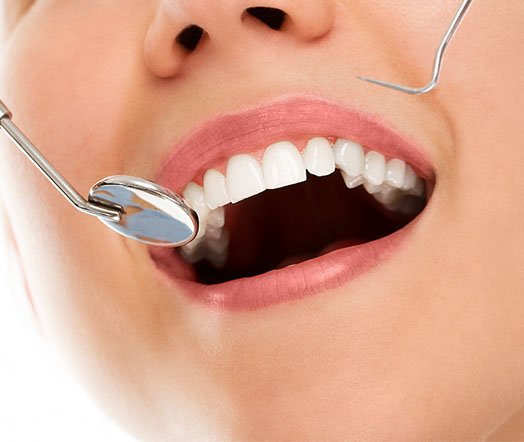Periodontal Care
Periodontal Examinations and Treatments
Periodontal Care Albury
Periodontitis is an infection that affects the soft tissue and bones supporting the tooth. Without treatment, the alveolar bone surrounding the teeth is slowly and progressively lost.

Facts on Periodontitis
- Periodontitis affects the area around the tooth, including the bone and the gum.
- It happens when bacteria and plaque build-up around the tooth, and the immune system launches a reaction.
- Good oral hygiene is part of both prevention and treatment, but sometimes surgery is necessary too.
- Smoking and the use of other tobacco products can increase the risk of developing gum disease and treatment not working.
- There is a link between gum disease and conditions elsewhere in the body, such as cardiovascular disease.
How to Prevent Gum Disease
Gum disease can be prevented by taking care of your teeth and by having regular dental check-ups that include a periodontal examination.
A little time invested in the prevention of this disease can improve dental and general health and can help minimise dental expenses.
Here are suggestions to help keep teeth, gums and supporting bone structures healthy:
- Brush teeth thoroughly at least twice a day. This removes the layer of plaque from the teeth. Be sure to use a soft-bristled toothbrush and anti-plaque toothpaste. Rinsing will not remove the bacterial plaque.
- Clean between teeth every day. Cleaning between teeth with floss or interdental brushes removes bacteria and food particles from areas between the teeth where the toothbrush can’t reach. Early-stage gum disease can often be reversed by proper oral care.
- Maintain a balanced diet. Choose a variety of foods, such as breads, cereals and other grains; fruits; vegetables; meat, poultry and fish; and dairy products, such as milk, cheese and yogurt — limit between-meal snacks and sweets.
- Visit your dentist regularly. Visit your dentist for regular dental check-ups, which include a thorough periodontal examination. Professional cleaning is important in preventing periodontal diseases. Once you’ve been treated for gum disease, these maintenance visits are especially important.
- Avoid smoking and using other tobacco products. Tobacco use can inflame gum tissue and aggravate the existing periodontal disease.
Treating Gum Disease
Periodontal Scaling: Once gum disease has started to destroy the gum and bone surrounding the teeth, regular cleaning will not be enough to stop the progress of the infection.
A procedure called periodontal scaling becomes necessary. This procedure removes plaque and tartar that are causing the infection below the gumline.

Other Procedures: When deep pockets of infection persist after periodontal scaling, corrective surgery or other treatment may be necessary.
Surgical treatment is performed to correct defects by reshaping or by regenerating new, healthy bones and gums.
After treatment, it is critical that patients practise good oral hygiene and that they seek regular professional maintenance care in the dental office.
Note: Gum diseases have been linked to cardiovascular diseases, low birth weight in babies and other health problems, so it is a condition that shouldn’t be taken lightly.
Periodontal Care in Albury
Treatment for gum disease depends upon the type and severity. Your Albury dentist will evaluate for periodontal disease and recommend the appropriate treatment.
Call us on (02) 6021 4171. Request your appointment online.
We are located at 525 Wilson St in Albury.
Frequently Asked Questions
What is gum disease?
How can I prevent gum disease?
Are there different kinds of gum disease?
Yes. In early-stage gum disease, also known as gingivitis, gums may become red and swollen and bleed easily. In advanced-stage gum disease, also referred to as periodontitis, teeth can loosen and even fall out. Proper oral hygiene and regular dental examinations are vital in the prevention and early detection of gum disease.